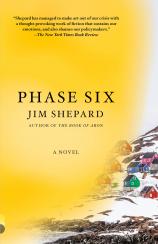Phase Six
Review
Phase Six
Just as the reality of the COVID-19 pandemic was beginning to take hold last year, New Yorker staff writer Lawrence Wright’s novel, THE END OF OCTOBER, provided a frighteningly prescient foretaste of some of what the world might be facing. Now, with cases falling and hope rising, Jim Shepard’s disturbing novel, PHASE SIX, arrives to inject a note of realism into the prevailing optimistic atmosphere. The next time --- and it’s almost certain there will be a next time --- could be worse. Much worse.
The pathogen that wreaks havoc in PHASE SIX (the title refers to the World Health Organization’s highest pandemic level) emerges in a tiny fishing settlement in Greenland, where aggressive efforts to mine rare earth deposits --- ironically to support the green economy --- are underway. One of those drilling projects releases “a cluster of molecules that had previously thrived in the respiratory tract of an early variant of the Bering goose and that had been trapped with some throat tissue in the crystalline framework during the Holocene glaciation.” Once 11-year-old Aleq and his best friend Malik inhale some of those spores at the site, and exposed miners depart for airports around the world, the race between disease and humanity is on.
"PHASE SIX is an impressive cautionary tale, and we can only hope that some of the people whose efforts might make a difference in preventing the next public health catastrophe will take the time to read it."
The novel focuses most of its attention on the efforts of two young CDC Epidemic Intelligence Service Officers --- epidemiologist Jeannine Dziri and Danice Torrone, a public health physician and self-described “medical detective” --- who dub themselves the “Junior Certain Death Squad.” They’re quickly dispatched to Greenland, where they discover that, along with its ability to spread rapidly (five weeks into the pandemic, some 14 million people have been infected worldwide), the disease has a terrifying power to kill quickly and with a lethality approaching 40 percent, far above the level of the coronavirus.
As Shepard describes it, the work of scientists like Jeannine and Danice is painstaking and often frustrating. It seems to Danice that “every third clue introduced a confounder, an element that seemed to drive the investigation off track. And each pattern that was initially found significant devolved into a maddening knot of ambiguities.” Their efforts are hampered by the fact that, as the settlement’s sole survivor, Aleq’s devastation over the deaths of his family members, his suspicion of the investigators’ motives, and, on a most basic level, his inability to speak English impede his desire and ability to cooperate in their investigation.
Shepard portrays a world in which few lessons seem to have been learned from our encounter with COVID-19. “Countries were like people: they didn’t value health until they lost it. And then once they got it back, they returned to their old complacency,” he writes. He doesn’t dwell on the social and economic effects of the pandemic, but having lived through 2020’s quarantines and lockdowns, there’s no need to say much more than “Amazon was unable to ship” or to mention a run on an antibiotic that had “generated pharmacy riots in seven cities in the South and Midwest” to paint a discomfiting picture of rising fear and chaos.
In short story collections like THE WORLD TO COME and YOU THINK THAT’S BAD, Shepard has displayed an affinity for stories that pit humans against the forces of nature, like the Dutch hydraulic engineer in “The Netherlands Lives with Water,” fighting to stave off an epic storm threatening Rotterdam, or the workers on a collapsing radar tower in the North Sea in “Safety Tips for Living Alone.”
PHASE SIX is built on a similar foundation, as Jeannine and Danice bring their scientific knowledge and inexhaustible grit to bear on the project of outwitting the bacteria. And like his short stories, Shepard’s novel bears the mark of prodigious research, with dozens of books, articles and interviews listed as source material. But he’s also an accomplished storyteller, and he avoids the common mistake of less talented writers of periodic information dumps that highlight the author’s diligence at the cost of slowing the novel’s narrative momentum.
Anyone looking for reassurance from Shepard would be well-advised to search elsewhere. Though he’s never specific about the death toll wreaked by his imaginary pathogen, he cites a 2006 survey in which 90 percent of the epidemiologists polled predicted a pandemic that would kill more than 150 million people in one of the next two generations.
“All of those pathogens that over time we’ve de-adapted to --- we keep sticking our noses everywhere, they’re all coming back,” Danice warns. “Who would you put your money on? Humans have been around for what, two hundred thousand years? And bacteria for like three and a half billion.” PHASE SIX is an impressive cautionary tale, and we can only hope that some of the people whose efforts might make a difference in preventing the next public health catastrophe will take the time to read it.
Reviewed by Harvey Freedenberg on May 28, 2021




